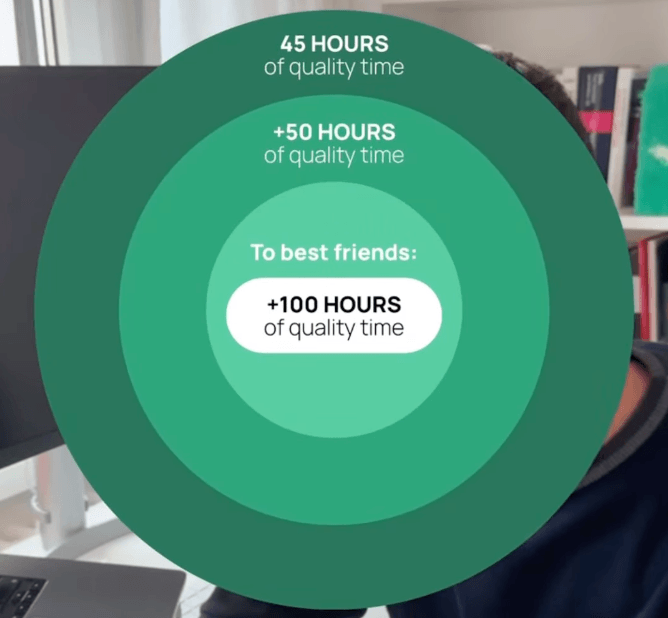

Friendship isn’t just about shared laughs or occasional catchups, it's about intentional connection and consistent effort. In an era where social interactions are increasingly digital and fleeting, building deep, lasting friendships requires time, commitment, and a conscious effort to prioritise meaningful conversations.
Research shows that forming strong friendships isn’t instantaneous - it takes time and effort. Dunbar’s number says it takes 45 hours of quality time to move an acquaintance to a friend...and another 50 hours (over three months) to move from a casual to a meaningful friend. To become a best friend, you need to invest another 100 hours of quality time.

Yet, despite the importance of friendships, we’re facing what experts call a Friendship Recession. According to the American Perspectives Survey, the percentage of U.S. adults who report having no close friends has quadrupled to 12% since 1990, while the number of people with ten or more close friends has dropped nearly threefold.
Additionally, the average time spent with friends plummeted from 6.5 hours per week to just 4 hours between 2014 and 2019. This decline isn’t just about busy schedules - it reflects a cultural shift where solitude is becoming the default, and social priorities are changing.
Friendships thrive when nurtured. Making time for regular check-ins, whether through texts, calls, or meetups, helps maintain strong bonds.
A 2024 study showed 90% of us have lost touch with a friend we care about. Despite this, people are surprisingly hesitant to reach out to old friends.
Whilst tech can sometimes seem to exacerbate the problems of friendships. Studies show that digital communication often leads to weaker bonds and can have a negative impact on mental wellbeing. A 2024 study showed face-to-face interactions have a significantly better effect on both physical and mental health. In contrast, connecting through phone calls or text messages didn’t offer the same benefits.
Virtual interactions can sometimes feel emotionally flat and, over time, may deepen feelings of isolation rather than ease them.
However, technology can be utilised to help you manage relationships and forge better connections. Apps like SoonCall encourage the habit of staying in touch, making it easier to pick up the phone and talk to those who matter most.
Friendships deepen through shared experiences - whether it’s travelling together, working on a project, or simply engaging in meaningful conversations. We've got some tips on creative ways to keep in touch in a blog post.
As Anne Helen Petersen puts it,
“Time for friends is a privilege, but it is also a matter of priorities”.
Making friendships a priority ensures they don’t fade into the background. We wrote about how to maintain long distance friendships in a recent blog post.
It feels like the quantity and quality of friendships are in serious decline, but multiple studies have shown that a simple phone call can make all the difference. Taking the time to connect with the people who matter to you the most is an investment in happiness and positive mental (and physical) health.
So, pick up the phone and call a friend today! (SoonCall can help you with that 😜).
Our mobile app is now available on iOS! Scan the QR code, or visit the App Store to download.